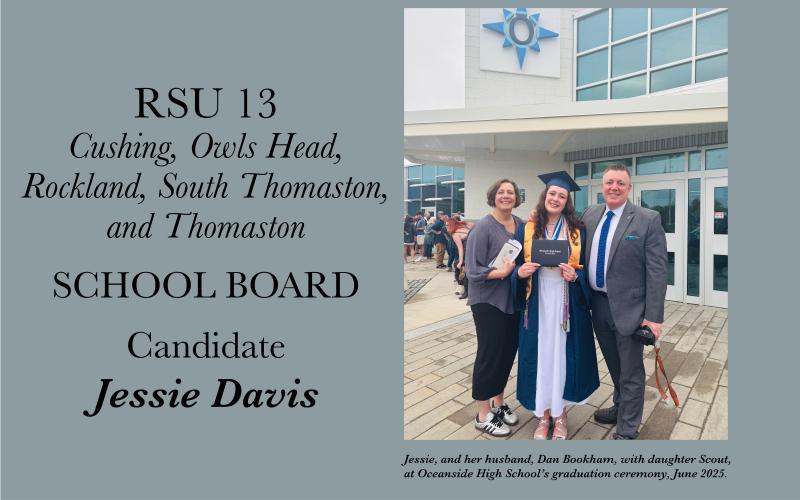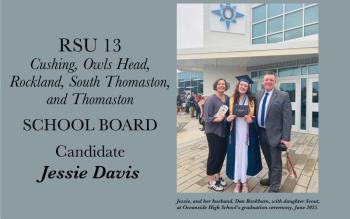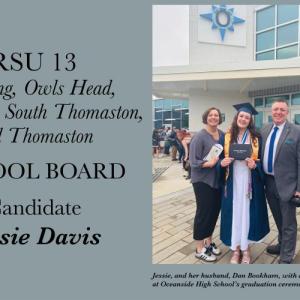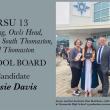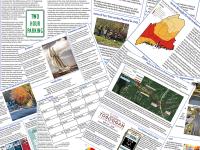RSU 13 School Board Candidate Jessie Davis
On November 4, Rockland voters will consider three candidates to fill two Rockland seats on the Regional School Unit 13 (Cushing, Owls Head, Rockland, South Thomaston and Thomaston) School Board. They are Douglas W. Curtis, Lydia Short and Jessie Davis.
PenBayPilot.com has circulated questions to the three school board candidates. Here, Jessie Davis responds to them:
My name is Jessie Davis. I’m a 14th generation Mainer and a nonprofit professional who recently retired from the Strand Theatre after 10 years as the organization’s executive director.
I am deeply rooted in service to the community professionally and personally. In addition to my work on the School Board, which includes serving on the RSU 13 Policy Committee, Student Engagement Taskforce, co-chair of the School Start Time Ad Hoc Committee, recent Teacher Contract negotiation team, and school board representative to Rockland’s Housing Taskforce, I serve as Board Chair at Trekkers, cook and deliver meals for The Landing Place and Lasagna Love, and am passionate about lifting up the good work of service organizations throughout the community.
What do you hope to accomplish as a public K-12 school board member?
I would like to continue to build on the successes that the current iteration of the RSU 13 School Board has accomplished, in conjunction with our incredible district staff, over the last three years of my current term. In that time the district has become one of the first in the region to implement universal pre-k, through partnerships with local organizations, providing the significant benefit of early interventions for students that need additional help and services. Intervention early means students are less likely to need extra support later in their learning journey.
Additionally, we’ve passed balance budgets with increases directly in line with the rate of inflation, designed and implemented long-term facility plans that will pay for themselves through energy savings and energy generation, and updated old policies to keep pace with the changing role our schools have been asked to play in the lives of students and families.
Going forward I would like to help the district implement an outward-facing communication plan that helps to keep the community beyond the classroom walls informed and engaged to our successes and challenges and help center our schools as a rallying point for the wider community to gather around.
2) How do you view the role of public education in the U.S., in Maine, and in the RSU 13 communities?
Public Education is essential to maintaining a strong democracy, economic stability within communities, better health outcomes for individuals, and an increased quality of life for all. It levels the playing field so that it isn’t just those who can afford the cost of tuition who have access to opportunities.
Funding for Public Education should be the top priority at all levels of government, especially at the federal level. Currently, federal support for education is under attack and threatens Title 1 (students from low-income families) and Special Education funding. The loss of these funds would be disastrous and shift the burden to local taxpayers, which would be untenable.
3) Is there enough local fresh food from area farms being integrated into RSU 13 free meal program?
I’m not going to pretend to know the answer to this, as it hasn’t been part of the board’s work these past three years. However, anything we can do to feed hungry students while also supporting the local agricultural economy is a total win and an initiative that I would support.
4) Does the curriculum adequately teach all children and teens about their role in a participatory democracy?
Yes. The first line of the district’s Curriculum Policy reads: It is the intent of the RSU 13 School Board to provide students with engaging learning experiences to prepare them for further education, careers, and meaningful participation as contributing members of their communities and citizens in a democracy.
We have a highly skilled Director of Curriculum, engaged curriculum committee members, and fully engaged educators that work tirelessly to ensure the policy’s charge is met beyond “adequately”.
Contrary to what I hear many in the wider public lamenting, students in our district do learn civics in school. In addition to what they learn in the classroom, they are encouraged to participate in the democratic process, whether through student government, schoolwide mock voting, voter registration drives for students 18-years old and up, involvement in school committees, as well as the opportunity to serve as student representatives to the School Board.
5) Should the subject of personal finance be addressed in all grades?
I don’t think personal finance needs to be taught at all levels. Real World math, which is offered at a high school level, is an opportunity for students to learn the skills they’ll need to navigate finances once they graduate. Parents/guardians also have a role to play and should encourage students to utilize the resources that are available to them to be best prepared for life after high school.
6) Do the RSU 13 schools need to strengthen the science and technology curriculum. If so, how so?
I don’t think we need to strengthen the curriculum, I think we need to ensure that educators, especially at the elementary school level, have adequate time and opportunities to teach these subjects and offer hands on activities for students to explore the STEM subjects.
For high school level students, we have an incredible resource in Rockland with Midcoast School of Technology. Oceanside High School sends more students to participate in their program than any other school in the region and many graduate career ready with certifications in hand.
7) Are there books that you would want pulled off the school library/classroom shelves?
Absolutely not. Full stop.
We live in a time when everything—good, bad, and worse—is available to anyone with an internet connection. Books are NOT the problem.
Censorship stunts the development of critical thinking skills especially for young learners. Reading materials included in curriculum, and available in the libraries, are chosen based on what has been deemed age appropriate. If a parent wants to keep their student from accessing certain materials that is their right, however, one parent’s personal choice should not impact on all students.
8) What is your understanding and opinion of the implementation of a social emotional learning approach?
The mission of the district is: RSU 13 is a learning community that ensures a safe, inclusive, and responsive culture that fosters relationships and the academic, social, and emotional growth of all learners.
This mission was adopted to recognize that we need to address each learner as a whole person, not just a vessel to deliver information to. Humans are social creatures, and our learning needs to reach beyond simply knowing math and spelling but include how to regulate our emotions and behaviors to set us up as individuals, and the communities we’re a part of, for the most successful outcomes.
9) What is your opinion of a cell phone-free policy in schools?
I believe we have struck a good balance at the high school with school staff effectively enforcing our existing policy that phones are only accessible during break and lunch.
In a perfect world we could limit all distractions for students, including cell phones, however we must be realistic—our students have a lot going on in addition to class time, so a chance for them to keep up with after-school jobs, extracurricular, and family schedules, is useful.
10) How will you, as a board member, help reduce the fiscal load on the taxpayer to fund education and maintain the facilities?
We continue to limit surprises by planning strategically for both the short and long term. However, there is no reasonable way to avoid cost increases due to inflation.
The state funding formula puts Rockland schools at a significant disadvantage—as a board member AND a resident of Rockland I will continue to lobby the legislature to make the funding formula more equitable to reduce the local taxpayers’ burden.
11) What books are you reading these days and which do you recommend others read?
A recent read that made a big impact was Poverty, By America, written by Matthew Desmond, 2023. It dissects the American Dream myth and uncovers the history and policy that has built, and maintains, the huge wealth disparity in the richest country in the world. This book was an eye-opener for me, and I believe it’s essential reading for the engaged citizen.

